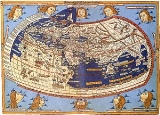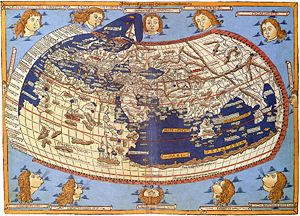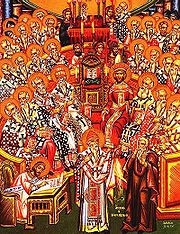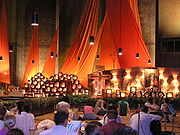
Oikoumene
Encyclopedia

Greek language
Greek is an independent branch of the Indo-European family of languages. Native to the southern Balkans, it has the longest documented history of any Indo-European language, spanning 34 centuries of written records. Its writing system has been the Greek alphabet for the majority of its history;...
(oikouménē, the feminine
Grammatical gender
Grammatical gender is defined linguistically as a system of classes of nouns which trigger specific types of inflections in associated words, such as adjectives, verbs and others. For a system of noun classes to be a gender system, every noun must belong to one of the classes and there should be...
present
Present tense
The present tense is a grammatical tense that locates a situation or event in present time. This linguistic definition refers to a concept that indicates a feature of the meaning of a verb...
middle participle
Participle
In linguistics, a participle is a word that shares some characteristics of both verbs and adjectives. It can be used in compound verb tenses or voices , or as a modifier...
of the verb , oikéō, "to inhabit"), short for "inhabited world". In modern connotations it refers either to the projection of a united Christian Church
Christian Church
The Christian Church is the assembly or association of followers of Jesus Christ. The Greek term ἐκκλησία that in its appearances in the New Testament is usually translated as "church" basically means "assembly"...
or to world civilizations.
Ancient world
EratosthenesEratosthenes
Eratosthenes of Cyrene was a Greek mathematician, poet, athlete, geographer, astronomer, and music theorist.He was the first person to use the word "geography" and invented the discipline of geography as we understand it...
of Cyrene
Cyrene, Libya
Cyrene was an ancient Greek colony and then a Roman city in present-day Shahhat, Libya, the oldest and most important of the five Greek cities in the region. It gave eastern Libya the classical name Cyrenaica that it has retained to modern times.Cyrene lies in a lush valley in the Jebel Akhdar...
(276-196 BC) deduced the circumference of the earth with remarkable accuracy. In his Geographia
Geographia (Ptolemy)
The Geography is Ptolemy's main work besides the Almagest...
, Claudius Ptolemy (83
83
Year 83 was a common year starting on Wednesday of the Julian calendar. At the time, it was known as the Year of the Consulship of Augustus and Rufus...
– 161
161
Year 161 was a common year starting on Wednesday of the Julian calendar. At the time, it was known as the Year of the Consulship of Caesar and Aurelius...
AD), refining existing knowledge of his day, provided a description of the known lands, and a calculation of the remainder of the Earth's surface. His Oecumene spanned 180 degrees of longitude from the so-called Blessed Islands (Μακάρων Νήσοι, probably the Cape Verde
Cape Verde
The Republic of Cape Verde is an island country, spanning an archipelago of 10 islands located in the central Atlantic Ocean, 570 kilometres off the coast of Western Africa...
islands) in the Atlantic Ocean
Atlantic Ocean
The Atlantic Ocean is the second-largest of the world's oceanic divisions. With a total area of about , it covers approximately 20% of the Earth's surface and about 26% of its water surface area...
to the middle of China
China
Chinese civilization may refer to:* China for more general discussion of the country.* Chinese culture* Greater China, the transnational community of ethnic Chinese.* History of China* Sinosphere, the area historically affected by Chinese culture...
, and about 80 degrees of latitude from Shetland to anti-Meroe (east coast of Africa
Africa
Africa is the world's second largest and second most populous continent, after Asia. At about 30.2 million km² including adjacent islands, it covers 6% of the Earth's total surface area and 20.4% of the total land area...
); Ptolemy was well aware that he knew about only a quarter of the globe, and an erroneous extension of China southward blocked off any awareness of the Pacific Ocean
Pacific Ocean
The Pacific Ocean is the largest of the Earth's oceanic divisions. It extends from the Arctic in the north to the Southern Ocean in the south, bounded by Asia and Australia in the west, and the Americas in the east.At 165.2 million square kilometres in area, this largest division of the World...
. Ptolemy knew that the oecumene, as then known, would not quite cover one-fourth of the calculated area of the globe. Having a love of symmetry, then, he predicted three additional continents along with the oecumene: Perioeci (lit. "same latitude, other side"), Antoeci (opposite the Perioeci) and Antipodes
Antipodes
In geography, the antipodes of any place on Earth is the point on the Earth's surface which is diametrically opposite to it. Two points that are antipodal to one another are connected by a straight line running through the centre of the Earth....
(lit., “opposite the feet”). The Greek cartographer Crates
Crates of Mallus
Crates, of Mallus in Cilicia , was a Greek language grammarian and Stoic philosopher of the 2nd century BC, leader of the literary school and head of the library of Pergamum. His chief work was a critical and exegetical commentary on Homer...
summed it all up on a globe created in about 150 BC.
Byzantine usage

Civilization
Civilization is a sometimes controversial term that has been used in several related ways. Primarily, the term has been used to refer to the material and instrumental side of human cultures that are complex in terms of technology, science, and division of labor. Such civilizations are generally...
world, and to be synonymous with the Roman Empire
Roman Empire
The Roman Empire was the post-Republican period of the ancient Roman civilization, characterised by an autocratic form of government and large territorial holdings in Europe and around the Mediterranean....
. This usage continued after the division of the Empire into East and West, and the Byzantine
Byzantine Empire
The Byzantine Empire was the Eastern Roman Empire during the periods of Late Antiquity and the Middle Ages, centred on the capital of Constantinople. Known simply as the Roman Empire or Romania to its inhabitants and neighbours, the Empire was the direct continuation of the Ancient Roman State...
Emperors would use the term to describe their imperial administration. Constantinople
Constantinople
Constantinople was the capital of the Roman, Eastern Roman, Byzantine, Latin, and Ottoman Empires. Throughout most of the Middle Ages, Constantinople was Europe's largest and wealthiest city.-Names:...
itself came to be known as the "Ecumenical City". The word was adopted within Christianity, especially for Synod
Synod
A synod historically is a council of a church, usually convened to decide an issue of doctrine, administration or application. In modern usage, the word often refers to the governing body of a particular church, whether its members are meeting or not...
s called by the Emperors and composed of bishop
Bishop
A bishop is an ordained or consecrated member of the Christian clergy who is generally entrusted with a position of authority and oversight. Within the Catholic Church, Eastern Orthodox, Oriental Orthodox Churches, in the Assyrian Church of the East, in the Independent Catholic Churches, and in the...
s throughout the world (see Ecumenical Councils).
In the year 586
586
Year 586 was a common year starting on Tuesday of the Julian calendar. The denomination 586 for this year has been used since the early medieval period, when the Anno Domini calendar era became the prevalent method in Europe for naming years.- Byzantine Empire :* The Vlachs are first mentioned in...
, the Emperor Maurice bestowed the title of Ecumenical Patriarch on the Patriarch of Constantinople
Patriarch of Constantinople
The Ecumenical Patriarch is the Archbishop of Constantinople – New Rome – ranking as primus inter pares in the Eastern Orthodox communion, which is seen by followers as the One, Holy, Catholic, and Apostolic Church....
. The intended meaning was that the Patriarch of Constantinople was the bishop of the imperial capital. Due to a mistranslation from the Greek into Latin, this led to a conflict between the patriarch at the time, St. John the Faster, and St. Gregory the Great
Pope Gregory I
Pope Gregory I , better known in English as Gregory the Great, was pope from 3 September 590 until his death...
over the use of the term. Gregory misunderstood the title as implying a universal jurisdiction and authority for the Patriarch of Constantinople. In Gregory's Epistle V:xviii he reproves Patriarch John for having "attempted to seize upon a new name, whereby the hearts of all your brethren might have come to take offence," not knowing that John had not desired the title, and not understanding its intent. The Patriarch of Constantinople still bears this title to this day.
Religion

Ecumenism
Ecumenism or oecumenism mainly refers to initiatives aimed at greater Christian unity or cooperation. It is used predominantly by and with reference to Christian denominations and Christian Churches separated by doctrine, history, and practice...
, the promotion of unity or cooperation between distinct religious groups within Christianity. Within this context, it has been suggested there exists (or shall exist in the future) a single believing community amongst the various different Christian groups. This definition—and its presuppositions—is not accepted by every Christian group. The work of ecumenism takes place in the form of negotiations conducted between committees of various denominations and also through the deliberations of inter-denominational organizations such as the World Council of Churches
World Council of Churches
The World Council of Churches is a worldwide fellowship of 349 global, regional and sub-regional, national and local churches seeking unity, a common witness and Christian service. It is a Christian ecumenical organization that is based in the Ecumenical Centre in Geneva, Switzerland...
. Relevant issues include Baptism
Baptism
In Christianity, baptism is for the majority the rite of admission , almost invariably with the use of water, into the Christian Church generally and also membership of a particular church tradition...
, the Eucharist
Eucharist
The Eucharist , also called Holy Communion, the Sacrament of the Altar, the Blessed Sacrament, the Lord's Supper, and other names, is a Christian sacrament or ordinance...
and Ministry
Christian ministry
In Christianity, ministry is an activity carried out by Christians to express or spread their faith. 2003's Encyclopedia of Christianity defines it as "carrying forth Christ's mission in the world", indicating that it is "conferred on each Christian in baptism." It is performed by all Christians...
.
Cultural history
In the context of cultural historyCultural history
The term cultural history refers both to an academic discipline and to its subject matter.Cultural history, as a discipline, at least in its common definition since the 1970s, often combines the approaches of anthropology and history to look at popular cultural traditions and cultural...
, the term was first used in an academic sense by Lewis Mumford
Lewis Mumford
Lewis Mumford was an American historian, philosopher of technology, and influential literary critic. Particularly noted for his study of cities and urban architecture, he had a broad career as a writer...
in his work, Technics and Civilization
Technics and Civilization
Technics and Civilization, written by Lewis Mumford in the 1930s , gives the history of technology and its interplay in shaping and being shaped by civilizations. According to Mumford, modern technology has its roots in the Middle Ages rather than in the Industrial Revolution...
(1934) and later popularised by William McNeill
William H. McNeill
William Hardy McNeill is an American world historian and author and is Professor Emeritus of History at the University of Chicago, where he has taught since 1947.-Biography:...
. In its modern cultural historic use, the term was popularised in McNeill's "Rise of the West" where he suggested that a single global oecumene was created through the dominance of European political institutions, science, technology, and economic forms, from the late 18th century onwards. One could argue that prior to the great voyages of discovery, initiated by Christopher Columbus
Christopher Columbus
Christopher Columbus was an explorer, colonizer, and navigator, born in the Republic of Genoa, in northwestern Italy. Under the auspices of the Catholic Monarchs of Spain, he completed four voyages across the Atlantic Ocean that led to general European awareness of the American continents in the...
, Vasco da Gama
Vasco da Gama
Vasco da Gama, 1st Count of Vidigueira was a Portuguese explorer, one of the most successful in the Age of Discovery and the commander of the first ships to sail directly from Europe to India...
and Ferdinand Magellan
Ferdinand Magellan
Ferdinand Magellan was a Portuguese explorer. He was born in Sabrosa, in northern Portugal, and served King Charles I of Spain in search of a westward route to the "Spice Islands" ....
, there were originally two separate world oecumenes - one covering north
North Africa
North Africa or Northern Africa is the northernmost region of the African continent, linked by the Sahara to Sub-Saharan Africa. Geopolitically, the United Nations definition of Northern Africa includes eight countries or territories; Algeria, Egypt, Libya, Morocco, South Sudan, Sudan, Tunisia, and...
and east Africa
East Africa
East Africa or Eastern Africa is the easterly region of the African continent, variably defined by geography or geopolitics. In the UN scheme of geographic regions, 19 territories constitute Eastern Africa:...
, Eurasia
Eurasia
Eurasia is a continent or supercontinent comprising the traditional continents of Europe and Asia ; covering about 52,990,000 km2 or about 10.6% of the Earth's surface located primarily in the eastern and northern hemispheres...
and its surrounding Japan
Japan
Japan is an island nation in East Asia. Located in the Pacific Ocean, it lies to the east of the Sea of Japan, China, North Korea, South Korea and Russia, stretching from the Sea of Okhotsk in the north to the East China Sea and Taiwan in the south...
ese, Indonesia
Indonesia
Indonesia , officially the Republic of Indonesia , is a country in Southeast Asia and Oceania. Indonesia is an archipelago comprising approximately 13,000 islands. It has 33 provinces with over 238 million people, and is the world's fourth most populous country. Indonesia is a republic, with an...
n and European archipelagos, and the other covering Mesoamerica
Mesoamerica
Mesoamerica is a region and culture area in the Americas, extending approximately from central Mexico to Belize, Guatemala, El Salvador, Honduras, Nicaragua, and Costa Rica, within which a number of pre-Columbian societies flourished before the Spanish colonization of the Americas in the 15th and...
, the South East of the USA, and the Andean region. It was the Spanish Conquistadores that fused this second oecumene within the first to create a single integrated "world system
World Systems Theory
The world-systems theory is a multidisciplinary, macro-scale approach to world history and social change....
".
Ecumenes in fiction
- The author J. R. R. TolkienJ. R. R. TolkienJohn Ronald Reuel Tolkien, CBE was an English writer, poet, philologist, and university professor, best known as the author of the classic high fantasy works The Hobbit, The Lord of the Rings, and The Silmarillion.Tolkien was Rawlinson and Bosworth Professor of Anglo-Saxon at Pembroke College,...
described his Middle-earthMiddle-earthMiddle-earth is the fictional setting of the majority of author J. R. R. Tolkien's fantasy writings. The Hobbit and The Lord of the Rings take place entirely in Middle-earth, as does much of The Silmarillion and Unfinished Tales....
setting for his fiction as equivalent to the Greek ecumene, the abode of MenHumanHumans are the only living species in the Homo genus...
. - In the Demon PrincesDemon PrincesThe Demon Princes is a five-book series of science fiction novels by Jack Vance, which cumulatively relate the story of one Kirth Gersen as he exacts his revenge on five notorious criminals, collectively known as the Demon Princes, who carried his village off into slavery during his childhood...
series of science fictionScience fictionScience fiction is a genre of fiction dealing with imaginary but more or less plausible content such as future settings, futuristic science and technology, space travel, aliens, and paranormal abilities...
novels by Jack VanceJack VanceJohn Holbrook Vance is an American mystery, fantasy and science fiction author. Most of his work has been published under the name Jack Vance. Vance has published 11 mysteries as John Holbrook Vance and 3 as Ellery Queen...
, Oikumene is the term used for the human-inhabited worlds of the galaxy. - In the science fiction novel Time's Eye co-authored by Arthur C. ClarkeArthur C. ClarkeSir Arthur Charles Clarke, CBE, FRAS was a British science fiction author, inventor, and futurist, famous for his short stories and novels, among them 2001: A Space Odyssey, and as a host and commentator in the British television series Mysterious World. For many years, Robert A. Heinlein,...
and Stephen BaxterStephen BaxterStephen Baxter is a prolific British hard science fiction author. He has degrees in mathematics and engineering.- Writing style :...
Oikoumene is a grassroots religious unification movement bridging the divide between CatholicismCatholicismCatholicism is a broad term for the body of the Catholic faith, its theologies and doctrines, its liturgical, ethical, spiritual, and behavioral characteristics, as well as a religious people as a whole....
and IslamIslamIslam . The most common are and . : Arabic pronunciation varies regionally. The first vowel ranges from ~~. The second vowel ranges from ~~~...
. - In The Left Hand of DarknessThe Left Hand of DarknessThe Left Hand of Darkness is a 1969 science fiction novel by Ursula K. Le Guin. It is part of the Hainish Cycle, a series of books by Le Guin all set in the fictional Hainish universe....
and other fiction by Ursula K. Le GuinUrsula K. Le GuinUrsula Kroeber Le Guin is an American author. She has written novels, poetry, children's books, essays, and short stories, notably in fantasy and science fiction...
, the EkumenEkumenThe Hainish Cycle consists of a number of science fiction novels and stories of Ursula K. Le Guin. Most of them are not set on the planet Hain, but have it as a distant background...
is a loose confederation of inhabited worlds, linked by instantaneous communication, but separated by slower-than-light travel. - In the science fiction trilogy The Golden AgeThe Golden Age (John C. Wright novel)The Golden Age is a science fiction trilogy by the American writer John C. Wright. It consists of three books, The Golden Age, The Phoenix Exultant and The Golden Transcendence.-Plot introduction:...
, by John C. Wright, a polity called the Golden Oecumene spans all of the Solar SystemSolar SystemThe Solar System consists of the Sun and the astronomical objects gravitationally bound in orbit around it, all of which formed from the collapse of a giant molecular cloud approximately 4.6 billion years ago. The vast majority of the system's mass is in the Sun...
. - In the halo universe, more particularly 'Halo:Cryptum', the Forerunner Ecumene spanned the galaxy by 100,000 years ago.
External links
- The Apotheosis of Homer showing personification of Oecumene
- Pope Gregory and the Universal Episcopate

